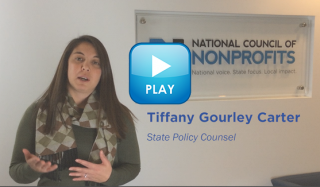Promoting volunteerism is a good thing, right? The federal and state governments have agencies that exist to get people involved in local activities, and numerous charitable organizations devote all of their efforts to connecting willing volunteers to needed projects in communities. So how should volunteer-welcoming organizations respond to the news that states are starting to impose work and volunteering mandates as conditions for Medicaid eligibility?
The U.S. Department of Health and Human Services announced its willingness to permit states to include work requirements as conditions for receiving health care benefits. Kentucky and Indiana are the first to receive federal approval for their work mandates and several other states are likely to follow in the coming weeks. The mandates typically include the option to “volunteer” at a nonprofit for 20 hours per week.

The lawfulness of a work requirement attached to health benefits is hotly debated and three organizations have already challenged the Kentucky program in court. But what about the inclusion of volunteering with nonprofits in the mandate? What’s the big deal about adding a volunteerism component? It’s that the volunteerism component runs counter to the cultures and missions of many organizations and it is a mandate.
First is the question of what message the mandate sends to individuals in need. The work requirement, and especially the volunteerism component, is sometimes call “community engagement” or “community service” allowing individuals to help individuals help themselves out of poverty. “Community service,” in particular, is a term also used in a different context, usually as an alternative to punishment for a criminal act. It has not been a crime to be poor in this country for hundreds of years, but equating punishments and health benefits is demeaning in the best of lights.
Many charitable nonprofits build rewarding volunteer experiences into their mission-delivery systems. Many more go the extra mile every day to help people who qualify for Medicaid through classes and job training, volunteer opportunities, and more. Charitable nonprofits are already committed to the welfare of the people who will be affected by the new Medicaid work mandate.
The very key point is that everything in the preceding paragraph relies on the voluntary engagement of nonprofits and individuals. The individuals want to be there, and the nonprofits want people who want to be there. In particular, nonprofits want volunteers who choose the organization because they are committed to the mission of the organization. The work/volunteering requirement under state Medicaid programs imposes an alien concept into the relationship. Call it by the oxymoron that it is: “mandatory volunteerism.”
Our nation recently celebrated the birthday of Martin Luther King, Jr. and many people commemorated the day by engaging in volunteer service. As Dr. King once said, “Life’s most persistent and urgent question is: What are you doing for others?” On that day, during the holiday season, and throughout the year, many nonprofits rely on the helping hands extended by people who seek to help others by volunteering. These are volunteers who are committed to “doing good.” The work/volunteering mandate introduces a group interested only in “doing time.”
It may seem counterintuitive, but there are just so many volunteers that any given nonprofit can accommodate. As nonprofit staff know all too well, volunteers aren’t free. It takes dedicated staff time to orient and supervise volunteers. For the sake of the children and others they serve, nonprofits perform background checks on employees and volunteers alike. The costs are justified and necessary. But they are costs nonetheless. Under these mandatory volunteerism proposals, nonprofits would be forced to track and certify, under penalty of perjury, the number of hours served. While it may sound nice for government to be sending free help to nonprofits, this mandatory volunteerism is really an unfunded mandate and heavy financial and administrative burden.
But let’s take this one step further and think about it from the perspective of the people nonprofits serve. Think back to a recent experience you had when it was obvious that the person you were interacting with didn’t want to be there. Was it someone working for the cable company? Or maybe the DMV? Now imagine that experience when you are at your most vulnerable. You aren’t hoping for your TV to be fixed in time for the latest episode of your favorite show. You are in need of food or shelter. You are relying on this person to help you. At a time when a friendly smile would mean the world to you, you could be facing someone scowling as they stare at the clock.
Nonprofits need to stand up to ensure mandatory volunteerism doesn’t get in the way of mission advancement. Pick up the phone to call your governor and your state legislators. Let them know the effects that mandatory volunteerism would have on your nonprofit’s work. Be sure your nonprofit is also engaging through its state association of nonprofits. And, if you haven’t already subscribed to Nonprofit Advocacy Matters to keep an eye on this issue, subscribe now!
